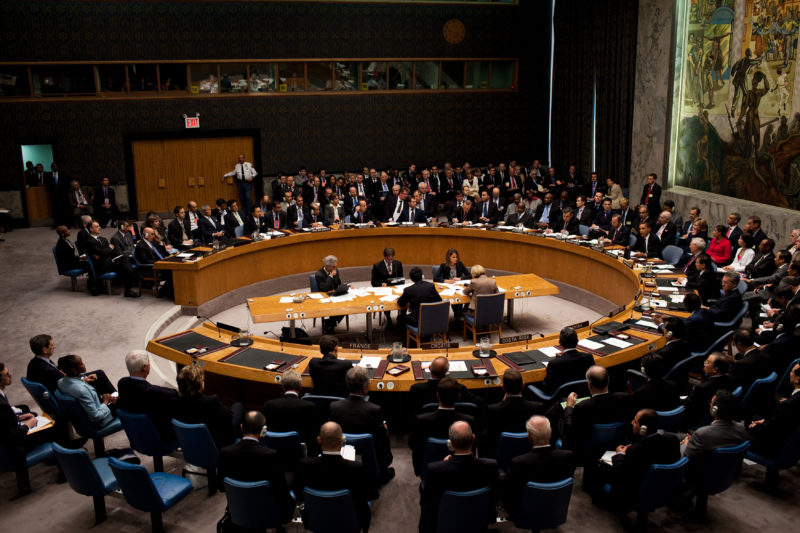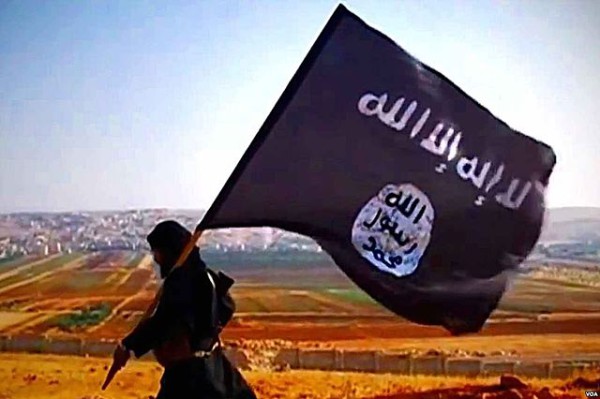Ben Mussett—Program Editor, Canada’s NATO
As in the past, this new round of sanctions was unlikely to curb North Korea’s provocative missile tests or development of nuclear weapons. And, as if on cue, it was quickly reported that North Korea had already resumed nuclear development. The regime also responded to the new sanctions by saying they “will make the U.S. suffer the greatest pain it ever experienced in its history” — so, it’s clear that the DPRK’s over-the-top bluster is not ending anytime soon either.
This doesn’t mean that economic sanctions on North Korea are not something the international community should continue to pursue. Yet for sanctions to succeed they must substantially disrupt the operations of the state in question. In other words, if sanctions don’t possess real teeth, the rogue state can continue to brush them off.
This brings us to the China-Russia dilemma. While both voted in favour of this recent introduction of sanctions, they only did so after the US significantly watered down the original draft. The two powers oppose excessive sanctions on North Korea, believing that they could be dangerously destabilizing and possibly lead to state-collapse, something that China, which shares a 1420 kilometre border with North Korea, is particularly concerned about. Additionally, neither of them are fond of the prospect of a greater US military presence in the region, an inevitability in the case of North Korean collapse.
And though Russian and Chinese concerns are arguably driven by self-interested politics, there are other reasonable concerns regarding how far is too far when it comes to sanctions. Aside from fears of destabilization, it is the civilian population who unfortunately suffers the most when new sanctions are introduced and, if harsh enough, the North Korean government would blame the international community for causing such hardship.
In the end, effective, non-military responses to the North Korean problem are elusive. Meanwhile, as discussed in last month’s issue of The Atlantic, the implications of a military response are terrifying. These new sanctions aren’t going to compel North Korea to drop its weapons’ program, but they do make things incrementally more difficult for the regime and potentially nudge things towards a non-military settlement to the conflict. It’s better than nothing.
Brett Carson—Program Editor, Canadian Armed Forces
The recent spat between the US and DPRK has been unsettling. Relations between the countries have always been tense, however, over the last few weeks they reached an unprecedented height. It is my opinion that one of the main factors for this recent escalation is the personalities of both President Donald Trump and Kim Jong Un. Donald Trump has privately stated that he believes he will be judged on how he handles this situation. They both fashion themselves as strong men and Trump has essentially labeled himself as the anti-Obama. So what is the opposite of Obama’s strategic patience strategy?
Fire and fury perhaps?
Hopefully not. Even if North Korea is not able to deliver its nukes via missiles, the damage it could wreak on South Korea using conventional weapons alone would be devastating. It may be a tough pill to swallow but perhaps the best course of action is the continuance of Obama’s strategy of strategic patience. Even after North Korea becomes a nuclear state it does not mean they would necessarily use them, as that would be suicidal. It is far from an ideal option, but the only one that doesn’t result in possibly the most costly war, in terms of human lives, since World War Two.
Edward Tat—Program Editor, Emerging Security
Economic sanctions are, by nature, a hit or miss approach. But, in the case of North Korea, they are almost always a miss. They failed to stop the regime from developing a nuclear weapon. They failed to stop the regime from starving, imprisoning, torturing, and murdering its own people. Worse yet, they failed to stop the regime from recklessly escalating political tensions in the region to the point where open conflict is possible. Time and time again, sanctions against North Korea have failed miserably because the regime has had decades of learned experience in flaunting them and, in many cases, shamelessly taking advantage of them.
The answer is the same as it has been for more than 60 years. The only way to change the political situation on the ground is to change the regime. Diplomacy, sanctions, and negotiations do little to nothing and, if anything, empower the Communist regime to further take advantage of its citizens and continue its malicious agenda. Weak-willed statecraft is the only reason North Korea ever obtained the A-bomb in the first place and the regime can only continue to take advantage of this. Behead the snake and take control. Then, the worries over human rights abuses and loose nukes will cease.
Nancy Qin—Program Editor, NATO’s Arc of Crisis
It is very unlikely that the sanctions will achieve their intended effect. North Korea’s nuclear situation is somewhat reminiscent of the American attitude towards China’s development of nuclear weapons in the 1960s. Recall that China was perceived as a rogue state then – and Mao’s aggression towards Taiwan during the two Taiwan Strait Crises was viewed to be dangerous and reckless by the United States (similar to the perception of Kim’s current actions). However, American efforts to dissuade the Chinese from becoming a nuclear state had little success. Mao regarded the acquisition of nuclear weapons as the key to becoming a superpower on the global stage, and he was prepared to make sacrifices for it. Chinese economic growth was largely non-existent from 1956 onwards (until late 1960s; China detonated its first atomic bomb in 1964) due to its rapidly expanding population, and Northern China especially suffered from food shortages in the wake of the Great Leap Forward. And yet Mao authorized a $85 million increase in funding to technological development and scientific research when he decided to pursue the development of nuclear weapons. North Korea appears to be just as dedicated to maintaining its nuclear arsenal; annihilating the United States in exchange for the deaths of the majority (but not all) of its nation’s population seemed to be a feasible plan, according to a North Korean official. For a nation that is ready to make such heavy sacrifices, the UN sanctions will not be enough to persuade it to give up its nuclear arsenal.
Ambika Varma—Program Editor, Women in Security
North Korea and America have always been at odds. Even with the semblance of improving relations during the Clinton era, the situation was far from ideal. Presently, two very similar leaders are leading these seemingly opposing nations. President Trump and Kim Jong-un are both susceptible to childish whims of anger, which lead to artless declarations. With their aggressive posturing, both leaders seem to be testing each other’s limits until a nuclear war ensues. Unfortunately for North Korea, the bastion of democracy — America, of course—holds a great deal of influence at the UN Security Council.
The latest round of sanctions placed on North Korea will most likely only serve to antagonize Kim Jong-un. While deterrence is usually a good war tactic, it appears that the young North Korean leader will only perceive it as a snub. The traditional tactic of leaving North Korea alone —for the most part— and practicing the art of patience, is a tactic that Trump refuses to use. With his ill-timed tweets, meant to antagonize, he riles up the most unpredictable possible nuclear power in the world and sets us all on edge. The latest round of sanctions has just highlighted American (or Trumpist) arrogance, and North Korea, a state historically known not to anguish over the loss of its citizens, appears ready to retaliate. In the midst of unfinished wars and terrorist turmoil, why is America testing North Korean power? Don’t we have enough to worry about, without the addition of a possible nuclear war on the horizon?
Daniel Jung—Program Editor, Society, Culture, and International Relations
Judging by the past behaviour of the regime, I believe that the new sanctions proposed by the UN Security Council will have little to no effect on North Korea. Firstly, even if the quality of life decreases for ordinary North Koreans, this will not be the first time they have faced such harsh conditions. Their economic conditions were much worse during the Korean Famine (1994-1998), when around 330 thousand people died due to starvation. Even the vast majority of those who survived faced near-death starvation for half a decade. As the government rations decreased, the masses opened illegal markets called jangmadang’s. As Jae Jun Suh demonstrates through her book North Korea’s Market Economy Society from Below, the markets not only made the people independent from government rations, but also improved the quality of life for the average North Korean by strengthening their smuggling roots. The case of the Korean Famine demonstrated that the regime was willing to let 330 thousand of its own citizens die instead of changing. Thus, I believe that fundamental changes to the regime’s behaviour are unlikely.
The North Korean citizens or their government haven’t enjoyed an abundance of oil in the last 30 years. Therefore, scientists have engineered clever ways to survive in a world without oil. One of the most common innovations was the moktancha [firewood automobile]; it is a vehicle which moves by burning firewood. These moktancha engines are commonly found on state owned cars and trucks. Another clever innovation is the ttongcha [human waste automobile]; the engines of these produce locomotion by burning human waste and other biological materials. Considering that they have these alternative fuels, it is unlikely that North Korea will change.
Photo: UN Security Council Meeting. (2009), by The White House Official Photostream. Public Domain.
Disclaimer: Any views or opinions expressed in articles are solely those of the authors and do not necessarily represent the views of the NATO Association of Canada.




